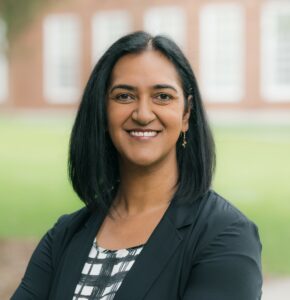
Dr. Bala Chaudhary
“Continent-Scale Aerial Dispersal of Fungi”
Monday, April 15, 2024, 5 p.m.
Augsburg University
Hagfors 150
“Strategies for Anti-Racist Action in STEM”
Convocation Lecture
Tuesday, April 16, 2024, 11 a.m.
Augsburg University
Hoversten Chapel
“Continent-Scale Aerial Dispersal of Fungi”
Mondy, April 15, 2024, 5 p.m.
Dispersal is a key process driving local-scale community assembly and global-scale biogeography of ecological communities. Plants in most ecosystems on Earth form close associations with mycorrhizal fungi, obligate root symbionts that improve plant access to soil resources in exchange for photosynthetically derived carbon.
Significant knowledge gaps remain regarding the mechanisms of dispersal for these cryptic, yet common plant symbionts. Combining macrosystems ecology, trait-based methods, eDNA metabarcoding, and data synthesis, we address fundamental questions in the emerging field of microbial movement ecology.
“Strategies for Anti-Racist Action in STEM”
Tuesday, April 16, 2024, 11 a.m.
Labs are our scientific homes, the front lines of where either inclusion and belonging are fostered, or where exclusion, marginalization, and discrimination occur.
As scientists are increasingly acknowledging the lack of racial and ethnic diversity in science, there is a need for clear direction on how to take antiracist action. Guidelines for developing antiracists policies and action are presented as well as discussion in an effort to promote racial and ethnic diversity, equity, and inclusion.
•
Bala Chaudhary, Ph.D., is an associate professor of environmental studies at Dartmouth College. She is a National Science Foundation CAREER Awardee and a member of the National Academy of Sciences Committee on Continent Scale Biology.
Research in her lab focuses on three areas: plant-fungal symbioses (mycorrhizas), continent-scale ecology (macroecology) and microbial dispersal (movement). She uses trait-based approaches to develop predictive frameworks for mycorrhizal dispersal, community assembly and biogeography, and employs complementary approaches of macroecological field work, controlled lab experiments, and data synthesis to study multi-scale questions in ecology.
Her work spans dozens of ecosystem types and has applications in global change solutions including climate mitigation and adaptation, soil conservation, ecosystem restoration, and sustainable agriculture.
Prior to academia, Dr. Chaudhary worked as an environmental consultant in Los Angeles designing and restoring drastically disturbed urban areas to create habitat for endangered species.
Dr. Chaudhary received the Early Career Motivator Award by the Association for Women in Science and the Woman of Spirit and Action Award for her work on promoting antiracism in STEM.
•
Sponsored by the General Leif J. Sverdrup Visiting Scientist Program and the Minnesota NASA Space Grant Consortium at Augsburg University.
